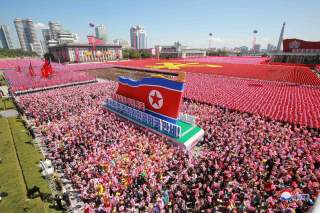North Korea and America’s Second Summit: Here’s What Ashley Feng Thinks Will Happen
"The Trump administration should include in any deal the disclosure of North Korea’s proliferation finance networks."
Editor’s Note: Want more ideas on what will happen at the summit? Check out all 76 expert opinions we gathered here.
At the end of February, U.S. President Donald Trump and North Korean Chairman Kim Jong-un will reportedly meet for the second time. The summit promises to be much like the first—showy, with limited steps towards the denuclearization of North Korea. Still, Pyongyang is likely to demand substantial sanctions relief in exchange for any moves, including largely symbolic dismantlement gestures. So what should Trump ask for in return? Rather than just focusing on missiles and nuclear materials, Washington should follow the money. In exchange for the limited licensing of some commercial projects, the Trump administration should include in any deal the disclosure of North Korea’s proliferation finance networks.
Rogue states frequently use both licit and illicit financial means to support their weapons of mass destruction programs. North Korea, in particular, exploits financial networks in places like China, Ethiopia, and even the United States to sustain its weapons programs, presenting a lasting threat to true peace on the peninsula. Despite international and U.S. sanctions, the Unha-3 rocket, which North Korea used to launch a satellite into orbit in 2012, contained components from many major Western economies.
While pushing for the disclosure of North Korea’s financial networks abroad bilaterally, the U.S. government should also pursue this problem multilaterally. The United States could work with like-minded partners in the region, like Japan, Singapore, and Malaysia, encouraging cooperation between high-risk jurisdictions. More specifically, the Treasury Department could launch a pilot partnership with these countries, sharing trade and financial data to fully understand the breadth of the proliferation threats and risks.
Notwithstanding the completion of a peace agreement, only by dismantling North Korea’s financial networks that enable them to enrich the pockets of the regime, and by extension, their weapons programs, can the international community best ensure peace on the Korean peninsula.
Ashley Feng is a research assistant for the Energy, Economics, and Security Program at the Center for a New American Security, focusing on East Asia and China. Previously, she was a China Studies Research Associate at the Council on Foreign Relations.
Image: Reuters


